Periodontics
Healthy gums and teeth with the UNI-DENT Dentistry Center
Periodontology is a branch of dentistry that deals with the diagnosis, treatment and prevention of periodontal disease, i.e. the tissues surrounding and supporting the teeth. At the UNI-DENT Dentistry Centre, we offer comprehensive periodontal services, helping patients maintain healthy gums and prevent problems that can lead to tooth loss.
What does periodontology deal with?
Periodontology focuses on the treatment and prevention of gum and bone diseases, such as gingivitis and periodontitis. These problems can lead to serious health consequences, including tooth loss, so early detection and treatment are key to maintaining oral health.
The most common periodontal problems:
- Inflammation of gums (gingivitis)
The first stage of periodontal disease, characterized by red, swollen, and bleeding gums. Untreated gingivitis can lead to more serious problems. - Periodontitis (periodontal disease)
An advanced form of gum disease that can lead to damage of the tissues that support teeth and, in extreme cases, to tooth loss. - Gingival recession
Receding gum line, which exposes the roots of the teeth and increases sensitivity. - Periodontal pockets
Spaces that form between the teeth and gums where bacteria accumulate, causing further inflammation.
Why is it worth choosing periodontology at the UNI-DENT Dentistry Center?
- Modern methods of treatment
We use advanced methods of periodontal treatment, including ultrasonic scaling, closed and open curettage, as well as regenerative procedures that help rebuild lost periodontal tissue. - Precise diagnostics
We use modern diagnostic technologies, such as digital X-rays and periodontal probes, to accurately assess periodontal health and plan effective treatment. - Experienced specialists
Our team consists of experienced periodontologists who ensure that each patient receives the highest standard of care and an individually tailored treatment plan. - Comprehensive prevention
Regular check-ups and professional hygiene treatments help prevent the development of periodontal disease and keep your gums healthy for years.
How is periodontal treatment carried out?
- Consultation and diagnostics
The first stage is a thorough assessment of the health of the gums and periodontium, including measuring the depth of the periodontal pockets and taking X-rays. - Treatment plan
Based on the diagnostic results, we create an individual treatment plan, which may include both hygiene treatments and more advanced surgical procedures. - Non-surgical treatment
In the initial stages of gum disease, we use professional teeth cleaning (scaling and sandblasting) and curettage, which involves cleaning the periodontal pockets. - Surgical treatment
In advanced cases, surgical procedures such as open curettage, gingival grafts or regenerative procedures that help rebuild periodontal tissues may be necessary. - Prevention
After completing treatment, regular check-ups and hygiene procedures are important to maintain the results achieved and prevent relapses.
Periodontology at the UNI-DENT Dentistry Center is a guarantee of comprehensive care for the health of your gums and teeth.
We invite you to a consultation to learn more about treatment options and effective methods of prevention.
Periodontology – treatment of periodontal diseases (periodontitis):
- professional teeth cleaning,
- removal of dental deposits (ultrasound scaling, sandblasting),
- fluoridation treatments,
- guided bone regeneration treatments,
- bone regeneration.
In what cases is bone reconstruction necessary?
1. Dental implants
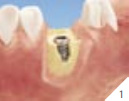
To strengthen and increase the volume of the jaw bones when using dental implants, when the existing amount of bone is not sufficient for long-term, stable tooth retention.
2. Periodontitis
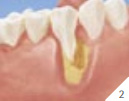
In order to preserve the existing teeth that have lost their stable anchoring as a result of the ongoing inflammatory process in the periodontium (bacterial dental plaque).
3. Extensive bone loss
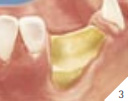
Bone reconstruction after extensive hard tissue loss.
4. Raising the floor of the maxillary sinus
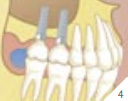
In order to preserve the existing teeth that have lost their stable anchoring as a result of the ongoing inflammatory process in the periodontium (bacterial dental plaque).
5. Tooth root resection or cyst removal
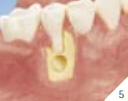
W celu odbudowy zniszczonej kości po przeprowadzonej resekcji korzenia zęba lub usuTo rebuild damaged bone after tooth root resection or cyst removal.